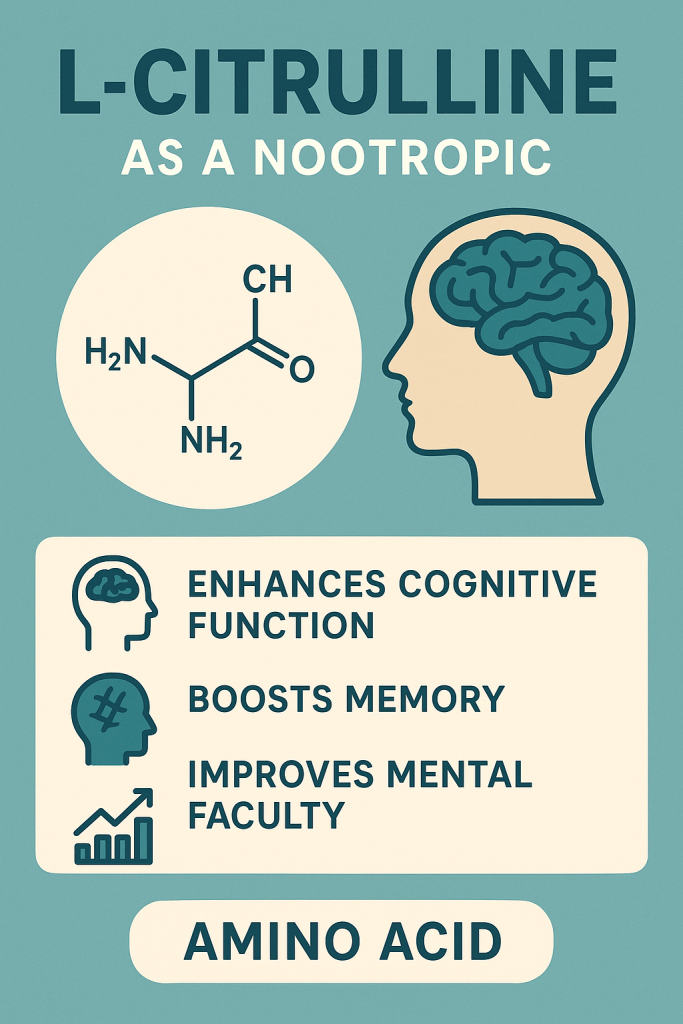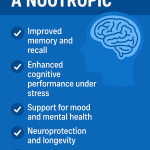Introduction: Citrulline as a Nootropic
Citrulline as a nootropic is gaining attention for its potential to boost brain power, improve focus, and enhance cognitive health. While most people recognize citrulline as an amino acid often linked with athletic performance and nitric oxide production, recent studies suggest its benefits extend to the brain as well. Nootropics, often called “smart drugs” or cognitive enhancers, are substances that support mental function—and citrulline appears to be one of nature’s underrated tools for sharper thinking, better memory, and overall brain health. If you’re curious about natural brain boosters, citrulline deserves a closer look.
What is Citrulline?
Citrulline is a non-essential amino acid first discovered in watermelon (its name comes from Citrullus vulgaris). Unlike essential amino acids, your body can produce citrulline naturally, but supplementing with it may provide extra benefits. It plays a key role in the urea cycle, helping the body eliminate ammonia, a byproduct of protein metabolism.
Most notably, citrulline is a precursor to arginine, which then increases nitric oxide (NO) production. Nitric oxide widens blood vessels, improves circulation, and enhances oxygen delivery throughout the body—including the brain. This connection is where citrulline’s potential as a nootropic becomes fascinating.
The Link Between Blood Flow and Brain Health
Why circulation matters for cognition
Your brain uses about 20% of your body’s oxygen supply despite being only 2% of your body weight. Proper blood flow ensures oxygen and nutrients reach neurons efficiently, which directly impacts focus, mental clarity, and memory. Poor circulation has been linked to brain fog, fatigue, and long-term cognitive decline.
By boosting nitric oxide and improving circulation, citrulline may help keep the brain sharp. Several studies have shown that enhanced cerebral blood flow is directly linked to improved mental performance, particularly in memory and attention tasks.
Citrulline as a Nootropic: The Cognitive Benefits
1. Improved Focus and Mental Clarity
Citrulline’s ability to enhance nitric oxide may reduce mental fatigue and sharpen focus. A study published in the Journal of Applied Physiology highlighted how citrulline supplementation improves oxygen delivery and reduces perceived effort during exercise. While the study focused on athletes, the same principle applies to the brain—greater oxygen efficiency supports sharper concentration.
2. Memory Enhancement
Research suggests that citrulline may have neuroprotective effects. A 2015 study in Frontiers in Aging Neuroscience explored citrulline’s role in Alzheimer’s disease models, finding that supplementation improved memory function. This aligns with the idea that better circulation helps protect and sustain long-term brain health.
3. Reduced Mental Fatigue
Brain fog is often linked to reduced blood flow or excessive buildup of metabolic waste. Because citrulline plays a role in the urea cycle, it helps the body clear out ammonia—a compound that can interfere with mental performance. By reducing metabolic “clutter,” citrulline may support sustained energy and mental stamina.
4. Neuroprotection Against Aging
One of the most exciting aspects of citrulline as a nootropic is its potential protective role against age-related decline. Poor vascular health is a leading risk factor for dementia and cognitive impairment. By supporting circulation and nitric oxide pathways, citrulline may help keep neurons healthier for longer.
The Science: What Studies Say About Citrulline and Cognition
While research is still developing, early studies support citrulline’s potential as a brain booster.
- Study 1: Alzheimer’s Disease and Memory Support
A 2015 study (Frontiers in Aging Neuroscience) showed citrulline supplementation improved spatial memory in Alzheimer’s models, highlighting its therapeutic potential. - Study 2: Nitric Oxide and Cognition
Research in the Journal of Cerebral Blood Flow & Metabolism emphasizes the role of nitric oxide in memory and learning, suggesting that citrulline’s NO-boosting effects may translate into cognitive benefits. - Study 3: Fatigue and Performance
A British Journal of Sports Medicine study revealed citrulline supplementation decreased fatigue and improved ATP (cellular energy) production. While primarily focused on physical performance, the same mechanism may reduce cognitive fatigue.
In short: the science isn’t as extensive as with other nootropics like caffeine or L-theanine, but the early findings are highly promising.
Citrulline vs. Other Popular Nootropics
How does citrulline compare to well-known cognitive enhancers?
- Caffeine: Provides immediate alertness but can cause jitters and crashes. Citrulline offers a more subtle, sustained improvement through circulation.
- L-Theanine: Promotes relaxation and focus. Citrulline complements this by supporting blood flow, making it synergistic when paired.
- Creatine: Supports brain energy metabolism. Citrulline aids circulation, helping deliver oxygen and nutrients, making it a good partner.
- Ginkgo Biloba: Another circulation-boosting supplement. However, citrulline also supports metabolic waste clearance, giving it an added edge.
Instead of replacing these nootropics, citrulline may stack well with others for a holistic brain-boosting strategy.
Recommended Dosage and Forms of Citrulline
Most studies use 6–8 grams per day of L-citrulline or citrulline malate. L-citrulline is the pure amino acid, while citrulline malate is bound to malic acid, which may provide additional energy benefits.
- For cognitive benefits: 3–6 grams daily may be sufficient, but research is ongoing.
- Timing: It can be taken in the morning for daytime focus or pre-workout to combine physical and cognitive support.
- Forms: Available as capsules or powder. Powder tends to be more cost-effective.
As with any supplement, consistency matters—citrulline works best when taken regularly, not just once in a while.
Potential Side Effects of Citrulline
Citrulline is generally considered safe and well-tolerated. However, some people may experience:
- Mild gastrointestinal discomfort (especially with higher doses)
- Lower blood pressure (since it widens blood vessels)
- Interactions with medications such as nitrates or blood pressure drugs
It’s always best to consult with a healthcare professional before starting a new supplement, especially if you have pre-existing medical conditions.
Who Should Consider Citrulline as a Nootropic?
Citrulline may be particularly helpful for:
- Students and Professionals: To support focus during long study or work sessions.
- Older Adults: To maintain circulation and protect against age-related memory decline.
- Athletes: To combine physical endurance with sharper mental stamina.
- Anyone Experiencing Brain Fog: To improve oxygen and nutrient delivery to the brain.
If you’re already using a nootropic stack, citrulline can be a natural addition without the overstimulation that some synthetic options cause.
Practical Tips for Using Citrulline for Cognitive Health
- Start Low, Build Up: Begin with 3 grams daily and increase gradually.
- Pair with Brain Foods: Combine with omega-3-rich foods (salmon, walnuts) and antioxidants (blueberries, green tea) for synergistic benefits.
- Stay Hydrated: Better circulation works best with proper hydration.
- Consider Stacking: Citrulline works well with caffeine + L-theanine, creatine, or ginkgo biloba.
- Consistency Over Quick Fixes: Unlike caffeine, citrulline is not a quick stimulant. Its benefits build gradually.
Future Research: Where Citrulline as a Nootropic is Headed
While studies on citrulline and brain function are promising, more human clinical trials are needed. Researchers are exploring citrulline’s role in:
- Alzheimer’s prevention
- ADHD support
- Reducing age-related vascular decline
- Enhancing workplace productivity
If these studies confirm what early evidence suggests, citrulline could soon become a mainstream natural nootropic.
Final Thoughts: Is Citrulline a Smart Choice for Brain Health?
Citrulline as a nootropic is an exciting, science-backed option for those looking to enhance brain health naturally. Its ability to improve circulation, reduce fatigue, and support memory makes it stand out from more common supplements. While not as fast-acting as caffeine, citrulline offers a gentler, long-term approach to cognitive support—with the added benefit of physical performance enhancement.
If you’re exploring nootropics and want a safe, effective, and natural choice, citrulline deserves a spot on your list.
Related Resource
Want to explore more ways to naturally boost your brain health and performance? Read our in-depth guide: The Brain Healthy Diet: How to Eat for Focus, Memory, and Long-Term Cognitive Health.



